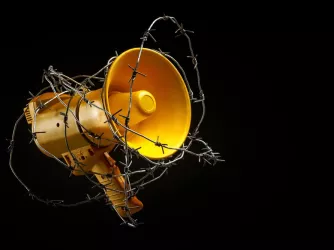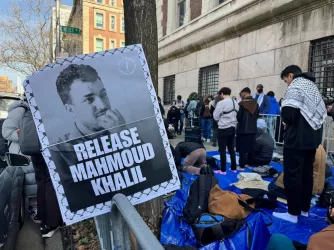Table of Contents
New Title IX regs are a confusing mess that threaten student rights

Shutterstock.com
New Title IX regulations that strip students of many due process and free speech protections previously guaranteed by the rules’ 2020 precursors go into effect today. Sort of. In about half of the states. Except for a bunch of schools in those states, where they don’t.
If this seems like a confusing mess, that’s because it is.
Title IX is the law prohibiting sex discrimination in federally funded education programs, which applies to nearly all colleges and universities, public or private. Most commonly thought of in regard to women’s athletics, through court decisions Title IX also came to govern how campuses handle sexual harassment and assault. What makes for a fair campus trial when someone is accused of sexual misconduct? How do campuses distinguish protected speech on controversial topics (such as sex, gender, and gender identity) from behavior that creates an environment so hostile that students shouldn’t be subjected to it? The governing interpretations of Title IX, and the regulations enforcing it, strongly affect how colleges answer these questions.
With concerns mounting about how colleges were applying Title IX to limit speech and conduct unfair procedures, the Department of Education adopted regulations in 2020 that directed schools to use the U.S. Supreme Court’s definition of hostile environment harassment in the educational context for Title IX hearings. Those regulations also curbed some of the most egregious problems that were making campus trials into kangaroo courts. But on April 19, 2024, the Department of Education formally issued new Title IX regulations. The new regs not only feature a definition of sexual harassment that threatens free speech, they also roll back critical fairness protections for campus Title IX tribunals, including the rights of students to access all evidence, to question witnesses at a live hearing, and even to have a live hearing at all.
With students returning to campus in the coming weeks, FIRE stands ready to defend their due process and free speech rights.
FIRE (along with many others) expressed strong concerns about these proposed changes to the Department of Education. Our criticisms rested not just on policy disagreements but on the legality and constitutionality of the proposed rules. When the Department chose to promulgate the rules anyway, many state attorneys general went to federal court to ask judges for injunctions to stop the new regulations from going into effect.
And in a string of court decisions unprecedented in this area, most judges granted those injunctions – as Brooklyn College professor and Title IX expert KC Johnson points out, 7 of 8 district court decisions did so, frequently echoing FIRE’s concerns about the new regulations’ due process and First Amendment problems.
As a result, in 26 states, the new federal regulations will not go into effect today (though they may later, as appeals proceed). This means that in those states, the previous regulations protecting student speech and due process remain in place. Drawing on maps Professor Johnson has posted on X, here’s a current map of the states where the new regulations take effect today (in red stripes) and where they do not (in green).

A state-by-state patchwork of “federal” regulations would be confusing enough. But it’s even more complicated than that. In the case brought in Kansas, the court issued an injunction against applying the new regulations at any schools attended by members of plaintiff organizations Female Athletes United or Young America’s Foundation, or by the children of members of plaintiff organization Moms for Liberty, even those in states where the regulations have otherwise taken effect. So, as Johnson points out, the new regulations will not take effect at any Ivy League school except for Brown University. For the same reason, the University of Wisconsin system is holding off on implementing policies based on the new regulations on all its campuses. The result is that students at many major universities may attend individual schools where the new regs don’t apply even if, at other schools in the state, they do.
If you are a victim of injustice under the new regulations, tell FIRE
Despite the injunctions, many thousands of students will still see their rights diminished under the new rules, and may face wildly unfair disciplinary proceedings and/or restrictions on their ability to speak about controversial topics. With students returning to campus in the coming weeks, FIRE stands ready to defend their due process and free speech rights. If you are at a college or university where the new regulations do apply and are unfairly punished under those rules, FIRE urges you to get in touch.
As the challenges to the new rules continue to work through the court system, FIRE looks forward to judges — and maybe even the Supreme Court — stepping in to block the new regulations nationwide, putting an end to this misguided and unwise effort to erode student rights.
Have your rights been violated? We want to hear about it. Submit a case to FIRE.
Recent Articles
FIRE’s award-winning Newsdesk covers the free speech news you need to stay informed.

VICTORY: Federal court blocks Texas A&M’s unconstitutional drag ban

Columbia caves to feds — and sets a dangerous precedent

American Jews must not give an inch on free speech — even when words hurt us


